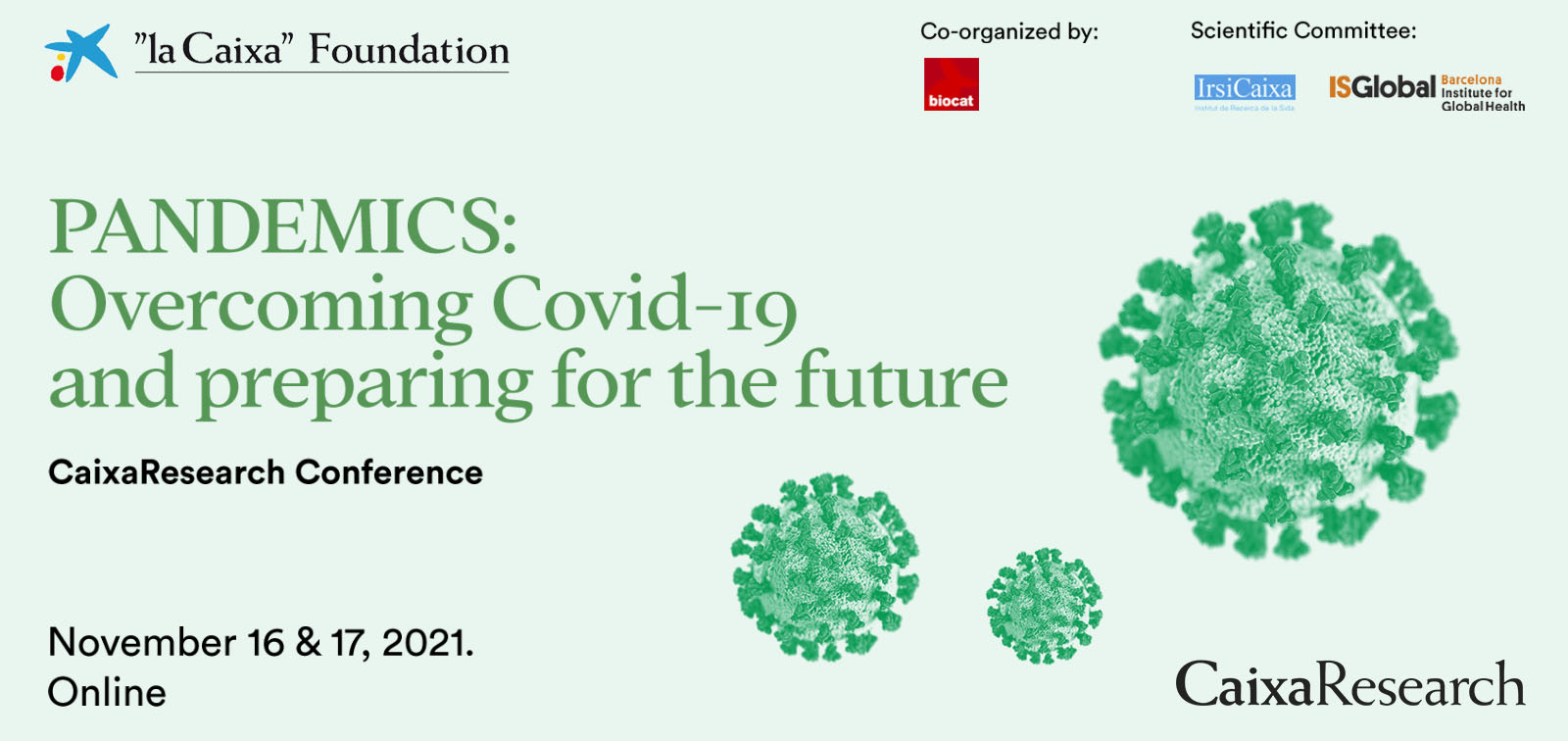Integrating human, animal and environmental health: key to confronting future pandemics
The CaixaResearch conference “Pandemics: overcoming Covid-19 and preparing for the future” brought together several international experts to talk about preparedness and response to future outbreaks under a One Health perspective
19.11.2021
We are 8 billion people in an increasingly globalized planet, whose ecosystems are being increasingly altered by our actions. Therefore, the probability of a new infectious outbreak emerging somewhere and spreading to the rest of the world is very high. What lessons can we draw from the ongoing crisis and how can we better prepare for future pandemics?
This was the topic of the CaixaResearch conference “Pandemics: overcoming Covid-19 and preparing for the future”, supported by the ”la Caixa” Foundation and Biocat, and organised by the Barcelona Institute for Global Health (ISGlobal) and the IrsiCaixa AIDS Research Institute. The event was held in a virtual format on November 16 and 17, and was attended by over 1000 people.
In his welcome talk, ISGlobal general director Antoni Plasència stressed the need to transcend borders and find solutions with global impact. For Maria Neira, director of the Public Health and Environment Department at WHO, “this is a critical moment for the global health community: we need to shift our focus towards preventing diseases and creating healthy environments.” In other words, integrate the notion of environmental health into human and animal health.
Diagnostics, treatment and vaccines
The first session of the conference reviewed lessons regarding the development of treatments and diagnostics for COVID-19. Nathalie Strub-Wourgaft, from DNDi, presented ANTICOV, a clinical trial platform designed to find combinations of effective and affordable drugs to treat moderate COVID cases in Africa. The pros and cons of current antiviral treatments were also discussed. For example, early antiviral treatments can be of great value but only if they go hand in hand with access to rapid diagnosis. And, as Sergio Carmona from FIND said, diagnosis was the only tool we had during the first pandemic waves, and played a key role in breaking transmission chains, guiding public health interventions, generating epidemiological data and surveying new viral variants.
The second session, moderated by Adolfo García Sastre from the Icahn School of Medicine Mount Sinai in New York, was dedicated to the tool that has allowed us to see the light at the end of the tunnel but whose distribution remains scandalously inequitable: vaccines. The more different vaccines we develop, the better, and in this sense two Spanish vaccine candidates in the pipeline were presented. But, as Clarissa Simas from LSHTM said, vaccines only save lives if people accept taking them. Europe is the region with lower vaccine trust, although many people fall somewhere in between total acceptance and total refusal. Regarding vaccine access, Carolyn Reynolds, cofounder of the Pandemic Action Network, said that the world cannot rely on the market in a crisis and talked about the reforms needed in terms of financing, manufacturing, procedures, governance and coordination between stakeholders to balance interest and investments for the global good.
Denise Naniche, scientific director at ISGlobal and Julià Blanco, researcher at IrsiCaixa, moderated a round table in which communication on vaccine risks and benefits and equity in vaccine access were discussed.
Zoonosis and health systems
The conference started its second day under the perspective of One Health (integrating human and animal health) to tackle zoonoses, and the role of climate change in the risk of zoonotic diseases (for example, an increase of 1oC in global temperatures will put 2 billion additional people at risk of malaria and dengue by 2100, said Rachel Lowe, from the LSHTM). “Currently, all medical investment goes to emergency medicine (i.e. treatments)” said Richard Kock, form the Royal Veterinary College in London. “We need a One Health strategy that addresses structural crises and unsustainability as the basis of the health systems pyramid.”
How to transform the public health system for the future was precisely the topic of the second session of the day, moderated by ISGlobal researcher Caterina Guinovart. The opportunities and challenges of using artificial intelligence at different levels (molecular, clinical and epidemiological) were discussed, as well as the need to create global digital public goods. The social factors driving the accumulation of two or more diseases or epidemics in a population (syndemic) were also discussed. Catalonia’s public health agency is shifting its focus towards promoting health and preventing diseases, as well as creating a centre of epidemiological intelligence, said Carmen Cabezas, Health Secretary for the Catalan government.
After a last session dedicated to innovation, Denise Naniche and Julià Blanco closed the day with the main conclusions, including the key role of multisectoral and interdisciplinary collaboration to avoid or reduce the impact of future pandemics.



